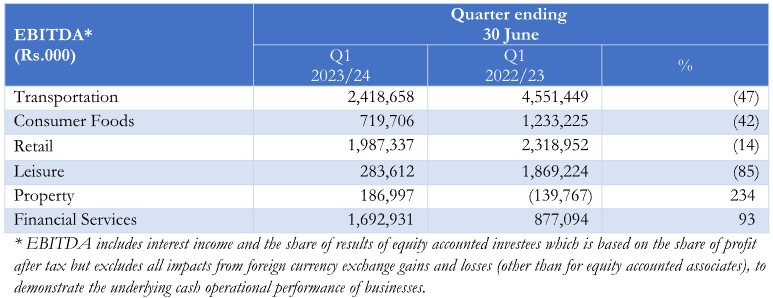
Summarised below are the key operational and financial highlights of our performance during the quarter under review:
Group PBT at Rs.1.40 billion in the first quarter of the financial year 2023/24 is a decrease over the Rs.14.80 billion recorded in the previous financial year. The first quarter of the previous year included Rs.10.12 billion of net exchange gains recorded on its US Dollar denominated cash holdings at the Holding Company, resulting from the steep depreciation of the Sri Lankan Rupee against the US Dollar during the quarter, whereas the quarter under review recorded corresponding net exchange losses amounting to Rs.359 million. In addition, PBT was also impacted on account of the higher finance expenses due to the high interest rate regime and the interest charged on the convertible debentures issued to HWIC Asia Fund (HWIC) in August 2022.
During the quarter under review, Sri Lanka continued to witness normal day-to day activities with all key macro-economic indicators showing sustained improvement, with inflation and interest rates recording a decline and the Rupee appreciating on the back of improved foreign exchange inflows and confidence.
Most of the Group’s businesses, particularly in Transportation and Leisure, had a negative impact on the financial performance due to the translation impact on account of the appreciation of the Rupee by approximately 15% over the corresponding period of the previous year.
Group EBITDA at Rs.9.23 billion in the first quarter of the financial year 2023/24 is a decrease of 31% over the EBITDA of Rs.13.33 billion recorded in the corresponding period of 2022/23, mainly due to the lower EBITDA at the Transportation and Leisure industry groups.
The groundwork on the West Container Terminal (WCT-1) at the Port of Colombo is progressing well with the entirety of the dredging works for both phases completed in May 2023. The construction of the quay wall has been awarded and preliminary work has commenced.
The Beverages business recorded a growth in EBITDA given the decline in input costs which are now translating to positive margin impacts on account of the stabilising raw material prices and the appreciation of the Rupee. The volume decline in both the Beverages and Frozen Confectionery businesses have shown encouraging recovery compared to the steep volume declines witnessed in the two previous quarters.
The Supermarket business recorded a strong performance in revenue during the quarter, particularly in the seasonal month of April, with same store sales recording an encouraging growth of 23%, primarily driven by customer footfall growth of 15%. The increase in revenue, as witnessed during the quarter, is expected to drive an improvement in EBITDA together with the benefits accruing from various productivity and cost efficiency initiatives.
The profitability of the Leisure businesses was adversely impacted by the Rupee appreciation during the quarter under review, particularly in the Maldivian Resorts segment and the Destination Management sector, and higher costs.
The discussions with leading international gaming operators are progressing well, where the commercial structures and arrangements are being negotiated, with a final agreement expected shortly. A substantial amount of work has been carried out, including detailed site visits, evaluation of the business case and operating model, fit-out requirements, designs and timelines.
The Property industry group recorded a growth in EBITDA driven by profit recognition from ‘TRI-ZEN’ and rental income from ten floors of ‘The Offices at Cinnamon Life’.
The Insurance business recorded encouraging double-digit growth in gross written premiums, driven by renewal premiums, and an increase in net investment income. Nations Trust Bank PLC recorded an increase in profitability driven by an increase in net interest margins through proactive asset liability management. Profitability in the quarter under review also benefited as it did not include impairment charges on Sri Lankan Government foreign securities given the higher provisioning adopted by NTB relative to its peers and the subsequent clarity on ‘haircuts’ as announced in the Domestic Debt Optimisation (DDO) programme.
The Group’s carbon footprint per million rupees of revenue increased by 12% to 0.42 MT while the water withdrawal per million rupees of revenue increased by 16% to 7.42 cubic meters, mainly due the decline in Group revenue in the first quarter compared to the corresponding quarter of the previous year.
